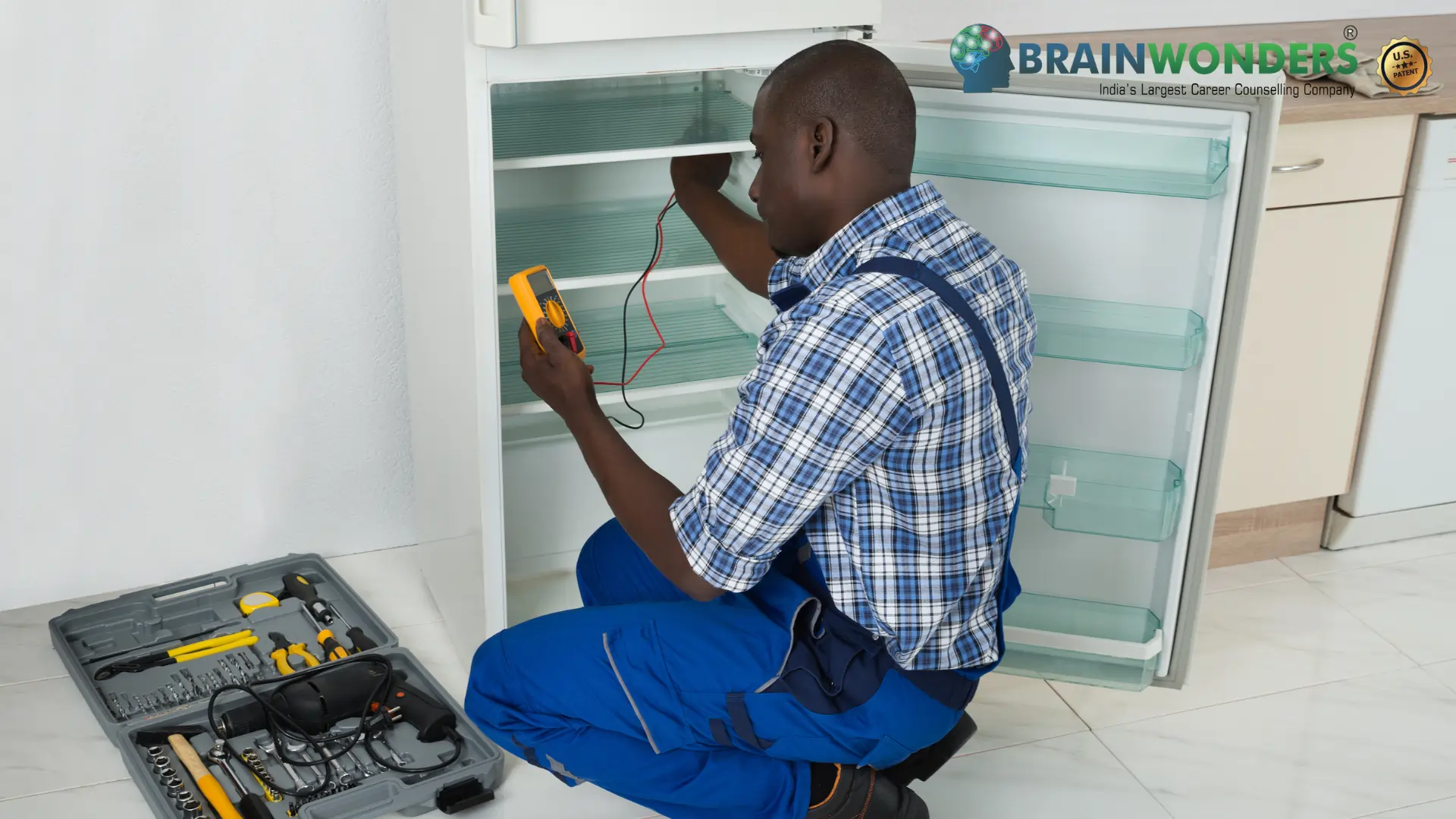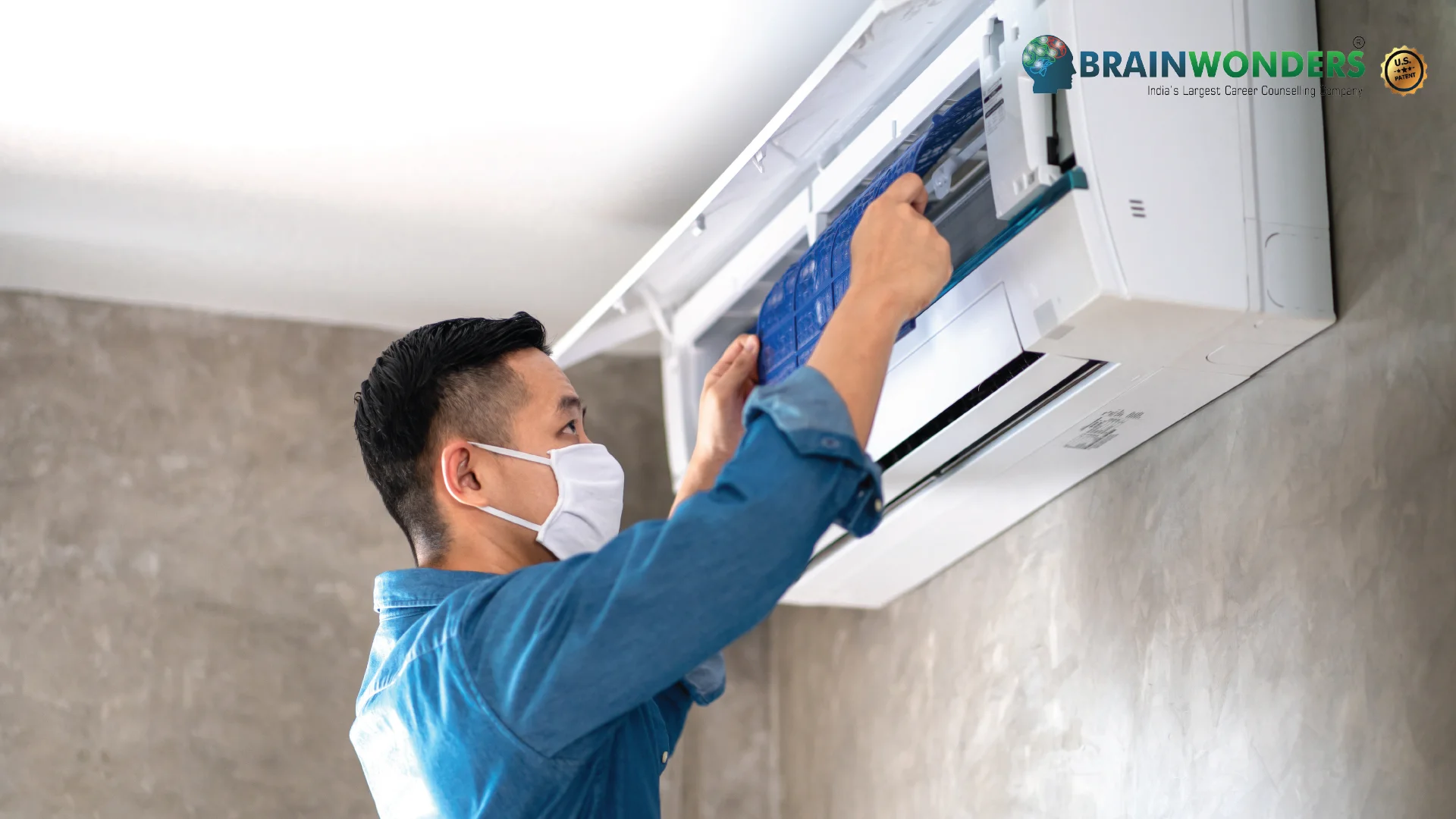How to become a Refrigeration & A.C. Mechanic
Overview, Courses, Exam, Colleges, Pathways, Salary

Overview
Who is Refrigeration & A.C. Mechanic ?
Technicians in the fields of air conditioning and refrigeration All forms of electric or gas household appliances, such as refrigerators, washers, dryers, and ovens, are repaired, adjusted, or installed. They keep an eye on and analyse appliances while they're running to look for particular problems like loose components or leaking liquids. they To determine the nature of appliance faults, speak with consumers or consult work orders. To diagnose and fix issues, professionals consult schematic drawings, product manuals, and troubleshooting guides. They also follow schematics to trace electrical circuits and perform testing with circuit testers and other equipment to find shorts and grounds.
Typical day at work
What does Refrigeration & A.C. Mechanic do?
A Refrigeration & A.C. Mechanic, also known as an HVAC-R (Heating, Ventilation, Air Conditioning, and Refrigeration) Technician, is a skilled professional responsible for installing, maintaining, and repairing refrigeration and air conditioning systems. Their primary role is to ensure that cooling and ventilation systems work efficiently and safely to maintain comfortable indoor environments and preserve the integrity of perishable goods.
Here are some specific tasks and responsibilities of a Refrigeration & A.C. Mechanic:
- Installation: They install various refrigeration and air conditioning systems, including split systems, central air conditioning units, refrigerators, freezers, and cooling towers. It involves setting up the components, connecting pipes, and ensuring proper electrical connections.
- Maintenance: Regular maintenance is essential to keep HVAC-R systems running efficiently. Mechanics inspect the systems, clean or replace filters, check refrigerant levels, lubricate moving parts, and perform any necessary adjustments to ensure optimal performance.
- Troubleshooting: When a cooling system malfunctions, mechanics use diagnostic tools and their knowledge to identify the issue. They may check for leaks, faulty electrical connections, or worn-out components and then proceed with repairs.
- Repairs: Once the problem gets identified, they undertake the necessary repairs, which may involve replacing damaged parts, fixing leaks, or recharging the refrigerant.
- Refrigerant Handling: Refrigeration & A.C. Mechanics trained in responsibly handling refrigerants to prevent environmental harm. They must follow proper procedures for recovering, recycling or disposing of refrigerants by environmental regulations.
- Upgrading Systems: Older HVAC-R systems may become less efficient as technology advances. Mechanics may recommend and install upgrades or energy-efficient systems to save on energy costs and reduce environmental impact.
- Customer Service: Mechanics often interact with customers, providing information, answering questions, and offering advice on how to use and maintain their HVAC-R systems effectively.
- Safety Compliance: Refrigeration & A.C. Mechanics follow safety protocols to prevent accidents and ensure that the systems they work on meet safety standards.
- Commercial and Industrial Work: In addition to residential settings, some HVAC-R mechanics may work in commercial or industrial environments, maintaining larger and more complex cooling and refrigeration systems.
Abilities and Aptitude needed
What are the skills, abilities & aptitude needed to become Refrigeration & A.C. Mechanic?
To become a successful Refrigeration & A.C. Mechanic, you need a combination of abilities, skills, and aptitudes. Here are some of the key attributes required for this profession:
- Technical Knowledge: An HVAC-R mechanic should have a strong understanding of refrigeration principles, air conditioning systems, electrical components, and heating systems. Knowledge of how to read blueprints and technical manuals is also essential.
- Mechanical Skills: Working with tools and performing hands-on tasks is crucial. Mechanics should be skilled in using various devices, such as wrenches, gauges, drills, and soldering equipment, to install, maintain, and repair HVAC-R systems.
- Problem-Solving Abilities: HVAC-R mechanics encounter various issues with cooling and refrigeration systems. Diagnosing problems, troubleshooting malfunctions and finding practical solutions is vital for success in this field.
- Attention to Detail: Precision is critical when installing or repairing HVAC-R systems. Attention to detail helps ensure that all components are correctly connected and that there are no leaks or safety hazards.
- Physical Fitness: The job of an HVAC-R mechanic can be physically demanding, requiring lifting heavy equipment, climbing ladders, and working in confined spaces. Good physical health and stamina are essential to perform the tasks efficiently.
- Safety Consciousness: Refrigeration & A.C. mechanics work with potentially hazardous materials like refrigerants and electrical systems. Safety-conscious and adhering to safety protocols are crucial to prevent accidents and injuries.
- Communication Skills: Effective communication is essential when interacting with customers, supervisors, and other team members. Explaining technical information clearly and understandably is necessary.
- Adaptability: HVAC-R mechanics often encounter different types of systems and unique challenges in various settings. Being adaptable and quick to learn allows them to handle multiple situations.
- Time Management: In the HVAC-R field, timely responses to service calls and completing projects on schedule are vital. Strong time management skills help in handling multiple tasks efficiently.
- Environmental Awareness: Refrigeration & A.C. mechanics work with refrigerants that can harm the environment if mishandled. Knowledge of environmental regulations and responsible refrigerant handling practices is essential.
- Customer Service: Excellent customer service is crucial, as HVAC-R mechanics often interact directly with clients. Being respectful, courteous, and attentive to customer needs helps build trust and ensures customer satisfaction.
- Continuous Learning: The HVAC-R industry constantly evolves with new technologies and regulations. A willingness to engage in ongoing learning and professional development is essential to stay current.
Salary
Salary for Refrigeration & A.C. Mechanic?
Refrigeration & A.C. Mechanic Salary in India:
- Minimum Monthly Salary: For entry-level Refrigeration & A.C. Mechanics or those with limited experience, the monthly salary might be around INR 15,000 to INR 25,000.
- Maximum Monthly Salary: Highly experienced and senior-level Refrigeration & A.C. Mechanics, especially those working with reputed HVAC-R companies or large industrial settings, may earn a total monthly salary ranging from INR 40,000 to INR 60,000 or more.
- Annual Salary: The annual salary for entry-level Refrigeration & A.C. Mechanics could be approximately INR 1.8 lakhs to INR 3 lakhs per year. Experienced and well-qualified mechanics may earn a maximum yearly salary ranging from INR 4.8 lakhs to INR 7.2 lakhs or more.
- Highest-Paying Jobs and Scope: The highest-paying jobs for Refrigeration & A.C. Mechanics in India are typically with well-established HVAC-R companies, large industrial plants, and specialized service providers. Mechanics who demonstrate strong technical skills, have expertise in handling advanced cooling systems, and work in high-demand sectors like pharmaceuticals or data centres can command higher salaries and may have opportunities for career growth into supervisory or managerial roles. With India's increasing emphasis on energy efficiency and climate control, the career scope for Refrigeration & A.C. Mechanics is promising. There is a growing demand for skilled professionals who can ensure the efficient operation of cooling and refrigeration systems, making their contribution vital to various industries and sectors.
Pathways
How to become an Refrigeration & A.C. Mechanic?
Entrance Exam
Entrance Exam for Refrigeration & A.C. Mechanic ?
Courses
Which course I can pursue?
Best Colleges
Which are the best colleges to attend to become an Refrigeration & A.C. Mechanic?
Industries
Which Industries are open for Refrigeration & A.C. Mechanic?
Refrigeration & A.C. Mechanics (HVAC-R Technicians) are in demand in various industries that rely on heating, ventilation, air conditioning, and refrigeration systems. Some of the sectors that offer opportunities for HVAC-R mechanics include:
- Residential Sector: HVAC-R mechanics employed by residential contractors or service companies to install and maintain air conditioning and heating systems in homes, apartments, and other residential properties.
- Commercial Buildings: Many commercial buildings, such as offices, shopping malls, hotels, and restaurants, require efficient HVAC-R systems to ensure a comfortable and pleasant environment for employees, customers, and guests.
- Industrial Facilities: Industrial settings often require specialised refrigeration for food storage, manufacturing, pharmaceuticals, and chemical processing. These industries may employ HVAC-R mechanics to maintain and repair cooling and refrigeration equipment.
- Retail and Supermarkets: Supermarkets and grocery stores rely on refrigeration systems to keep perishable items fresh. HVAC-R mechanics are vital in maintaining these systems to ensure food safety and prevent spoilage.
- Hospitals and Healthcare Facilities: Hospitals and healthcare facilities require precise climate control to maintain sterile environments and ensure the comfort of patients, making HVAC-R mechanics essential in these settings.
- Educational Institutions: Schools, colleges, and universities need properly functioning HVAC-R systems to provide a conducive learning environment for students and staff.
- Data Centers: Data centres generate significant heat due to their high-tech equipment, requiring advanced cooling systems to prevent overheating. HVAC-R mechanics help maintain these critical cooling systems.
- Pharmaceutical Industry: Pharmaceutical manufacturers need precise temperature and humidity control for storing sensitive medications and chemicals. HVAC-R mechanics play a crucial role in ensuring compliance with regulatory standards.
- Energy and Utilities: Some HVAC-R mechanics may find opportunities in the energy and utilities sector, maintaining cooling systems in power plants or other facilities.
- Government Agencies: Government organisations, including municipal facilities and military installations, often require HVAC-R technicians to maintain government buildings and infrastructure.
- Aerospace Industry: The aerospace sector may employ HVAC-R mechanics to maintain climate control systems in aircraft and spacecraft.
- Marine and Shipping: Large ships and marine vessels may have complex refrigeration systems for storage and food service, requiring the expertise of HVAC-R mechanics.
internship
Are there internships available for Refrigeration & A.C. Mechanic?
Internship opportunities for Refrigeration & A.C. Mechanics can benefit individuals looking to gain practical experience, enhance their skills, and get a feel for the HVAC-R industry. Internships allow aspiring mechanics to work under the guidance of experienced professionals, learn about the day-to-day operations of the field, and apply their theoretical knowledge in real-world scenarios. Here are some potential sources for finding internships in this field:
- HVAC-R Companies: Many HVAC-R companies offer internships to students or entry-level individuals interested in becoming Refrigeration & A.C. Mechanics. Contact local HVAC-R service providers, contractors, or manufacturers to inquire about internship opportunities.
- Trade Unions and Apprenticeship Programs: Some trade unions and professional organizations in the HVAC-R industry facilitate apprenticeship programs that provide hands-on training and internship opportunities. These programs can be a great way to get started in the field.
- Technical Schools and Colleges: Vocational and technical schools offering HVAC-R programs may partner with local companies, helping students secure internships as part of their training.
- Online Job Portals and Career Websites: Check popular job portals and career websites for internships in the HVAC-R field. Companies occasionally advertise internships for aspiring Refrigeration & A.C. Mechanics on these platforms.
- Networking: Attend industry events, job fairs, or workshops related to HVAC-R to connect with professionals and potential employers who may offer internship opportunities.
- Government and Municipal Programs: Some government agencies or organizations may offer internship programs related to HVAC-R, especially in areas where public buildings and facilities require maintenance.
Career outlook
What does the future look like for Refrigeration & A.C. Mechanic?
The career outlook for Refrigeration & A.C. Mechanics appears promising. As the demand for heating, ventilation, air conditioning, and refrigeration systems continues to grow in various industries, so does the need for skilled technicians to install, maintain, and repair these systems. The increasing focus on energy efficiency and environmental sustainability drives the demand for updated and eco-friendly HVAC-R technologies, leading to opportunities for mechanics with expertise in modern systems.
Moreover, the retirement of experienced technicians creates a workforce gap, further enhancing job prospects for new entrants. As technology evolves, HVAC-R mechanics must stay up-to-date with advancements in intelligent controls, renewable energy integration, and refrigerant regulations. Specialization in specific industries, such as healthcare or data centres, could also open niche career paths.
Overall, Refrigeration & A.C. Mechanics enjoy steady job growth and stable employment prospects, making it a promising career choice for individuals with the right skills and dedication to adapt to the changing demands of the industry.



